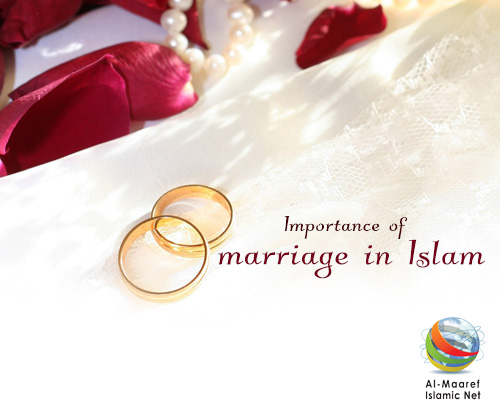Marital
Problems
Jealousy and Woman’s Work
Jealousy
Faith and ethics in both the man and the woman are considered two
major conditions for the stable and happy marriage. This is so because the
obedience to the divine teachings and the commitment to the moral and human
standards which Islam indicated and which the human being recognizes a lot of by
means of reason and pure nature establish marriage on the correct base. And any
marriage established on these firm bases is going indispensably to go on without
the little problems being able to affect it.
Jealousy is one of the terms which may cause problems in the marital life in
case it exceeds its reasonable and natural limit and in case it turns from being
a virtue into a vice.
It is meant by jealousy man’s vigilant concern in the woman and the woman
vigilant concern in the man.
What is permissible and what is not permissible with respect to jealousy?
What is the limit which the religion can agree on?
What are the methods for the management of the dispraised jealousy, so that it
will not cause deep wounds in the souls, thus affecting the continuity of the
marital life?
The Jealousy of the Man
Jealousy is «one of the praiseworthy morals and noble merits. It represents the
change of the human being from his usual state and inclination to the state of
defense and revenge when others transgress what is respectful to him like the
religion or honor or fame and what he believes to be of his own dignity, and no
human being- any human being- in general is void of this instinctive
characteristic since it is one of the natural dispositions in the human being.
Islam is a religion based on the natural disposition in which the things stated
by the nature of the human being are regulated in order to limit it to what
implies the righteousness of the human being in his life and to cancel what is
useless in it from the aspects of defect and corruption.»1
May noble narratives spurred on being endowed by the characteristic of jealousy;
it is related in one narrative that Allah’s prophet (Allah’s prayers and peace
bestowed upon him and his Household) said, «I am jealous, and The Most Glorious
and Reverent Allah is more jealous than I am. And The Most High Allah loves the
jealous one from his servants.»2
The Evil of the Jealousy of the Man
Jealousy is, therefore, a noble characteristic and an evidence of soundness and
healthiness. Still, in case it is put in another position rather than its proper
position or in case it gets out of its limits and its nature, it turns to be a
disease and may result in problems if it reaches an extent with which the wife
feels distrust. Then, the woman will refuse this condition and will demand that
the man gets her out of the prison which he has put her in as a result of his
doubts.
It is related that Allah’s prophet (Allah’s prayers and peace bestowed upon him
and his Household) said, «There is a jealousy which Allah likes, and there is
a jealousy which Allah detests. As regards what He likes, it is the jealousy in
doubt. And as regards what He detests, it is the jealousy in anything rather
than doubt.»3
Some narratives point out to that the jealousy in its improper position may lead
the woman to deviation! The Prince of the Believers (Allah’s peace bestowed upon
him) in his recommendation to his son Al-Hassan (Allah’s peace bestowed upon
him) warned, «Beware of jealousy not in the position of jealousy, for this calls
the righteous [woman] among them to evil. Still, have a firm hold of them: In
case you recognize any defect, hasten in reproaching them [whether] old or
young.»4
The Jealousy of the Woman
Jealousy, in its negative aspect, is considered to be from the diseases with
which the woman may be afflicted and be led to take negative steps which may
annoy the husband and tense the environments of the family.
When the narratives talk about jealousy of the woman, what is meant is its
negative aspect, and not the positive aspect, which has bad and destructive
consequences. It is related that one man mentioned his wife to Imam Al-Sadik
(Allah’s peace bestowed upon him) and praised her, so Abou Abdullah (Allah’s
peace bestowed upon him) asked him, «Have you made her jealous [on you]?» That
man answered, «No.» Then, he (Allah’s peace bestowed upon him) said to him,
«Make her jealous [on you].» When he made her jealous [on him], she became
steady. That man said to Abou Abdullah (Allah’s peace bestowed upon him), «I
made her jealous, so she became steady.» He (Allah’s peace bestowed upon him)
then said to him, «She is as you say.»5
1- The Reasons: The psychological reasons of
the jealousy of the woman are various. Its source may be positive, as is pointed
in the following narrative which is related in ascription to Imam Al-Sadik
(Allah’s peace bestowed upon him) that one asked him, «Can it be that the woman
is jealous on the man to the extent that she hurts him?» Imam Al-Sadik (Allah’s
peace bestowed upon him) answered, «It is from love.»6 The
consequences of this kind of jealousy are indispensably not harmful because love
results in consideration and care and does not take things towards troubles.
On the other hand, the source of the jealousy of the woman may be negative, as
is pointed out by the following narrative which is related in ascription to Imam
Al-Baqer (Allah’s peace bestowed upon him), «The jealousy of women is envy,
and envy is the source of atheism. When women- except for the Muslims- become
jealous, they get angry; and when they get angry, they become atheists.»7
When the jealousy starts from the feeling with defect and envy from the
others, this will be devastating and will definitely have negative consequences,
and this is what leads to anger and to the disobedience of the Islamic
standards.
2- The Results: The results of jealousy are at many times negative
and devastating. Usually does the woman who gets jealous lose her logicality,
reasonability in the evaluation of issues, and rationality in behavior; and
usually do her conducts become governed by anger and tension. It is related that
The Noblest Prophet (Allah’s prayers and peace bestowed upon him and his
Household) said, «The jealous woman can not recognize the top of the valley
from its bottom.»8 Once the human being loses his insight, he
becomes exposed to all sorts of problems and negatives.
The Work of the Woman
The work of the woman is from the questionable issues, so what is the attitude
of Islam from it? And what is its position with respect to the priorities of the
woman?
The work of the woman sometimes causes the problems with which some marriages
are afflicted and which blur the marital life. There is also the problem of the
husbands whose work requires that they stay outside their houses for days or
weeks or months. Then, how can the wife face life in the condition of her
husband’s repetitive absence for long periods from the house?
Woman’s Activities outside the House
It is doubtless that the woman has her own general social role which she should
carry out. The Most High Allah says, {The believers, men and women, are
Awliya (supporters, helpers, friends, protectors) of one another, they enjoin
Al-Maruf (i.e. Islamic monotheism, and all that Islam orders one to do) and
forbid from Al-Munkar (i.e. polytheism and disbelief of all kinds, and all that
Islam has forbidden)…}9
The scope of this role may, in accordance to the woman’s capacities and the
priorities governing her life in addition to the conditions of the society,
widen to reach the entire nation or narrow to be included just within a specific
frame.
It is doubtless that the woman has a major role as regards the supply of her
children with the spiritual needs i.e. education, guidance, etc. But when the
subject under discussion is the work of the woman, the question raised is
related to the providing for the materialistic needs of the family by means of
working outside the house in order to procure the livelihood. What is the
attitude from this kind of work?
Islam did not assign to the woman the responsibility of procuring the livelihood
for the family; on the other hand, Islam imposed this responsibility on the man.
This manner represents the healthy situation for the happy family where every
member carries out his/ her special responsibility which adequates to his/ her
personality and nature, in order that he/ she will complement with the other
members in filling in the gaps and in procuring the materialistic and spiritual
needs inside and outside the family.
In spite of this, Islam did not prohibit the work of the woman outside the house
if this is within the correct religious rules. Even more, this work becomes
preferable in some cases, among which we mention the following:
1- In Case of Financial Need: Seeking after
the religiously permissible livelihood is regarded to be a worship as is
ascribed to The Noblest Prophet (Allah’s prayers and peace bestowed upon him and
his Household), «The worship is made up of seventy parts, the best of which
is to seek after what is religiously permissible.»10
If the woman and those whom she provides for, in case there are persons whom she
provides for, are in a financial need, it is doubtless that her work becomes
preferred and demanded and will be better than that she be afflicted with
poverty or be obliged to humiliate herself in order to get the help of the other
people.
2- In Case of Free Time: Islam refuses the
free time and laziness. It is related in the narrative ascribed to Imam Musa Al-Kathem
(Allah’s peace bestowed upon him) that he said, «The Most Glorious and
Reverent Allah detests the servant who sleeps a lot and has nothing to do.»11
In case a woman has a lot of free times to the extent that if she does not
occupy them with work, she will be a confirmation of the servant who sleeps a
lot and who has nothing to do; then it is preferable for her to work.
3- A Special Importance Attached to Work:
The work which the woman performs may be very important from the religious
aspect, such as: the institutions which spread the religion among the people,
which reform the society, and which are interested in the social work; or the
specialization in the feminine medicine; etc. The woman may be occupied with
these important works in order to serve the religion and the society, and she
may receive money i.e. salary in change for the work she performs, so that she
will live honorably and nobly. These works, even though they procure the
livelihood, basically aim at the service of the religion and the society;
therefore, they remain to be preferred for themselves.
Arrangement of Priorities
The priority which must take the most prominent position in the concerns of the
woman is that of the familial work. It is meant by priority to exert the effort
and to do everything that may bring about happiness inside the family. After
that, the woman enters into her society and carries out her role and duty as
regards education, mobilization, activities, and suitable deeds.
In case there is ruin in her house and in case there are a lot of problems in
it, this means that she will get out to the society tense and ineffective and
will carry her crises to the society in one way or another. Even though she
pretends that she is in control of herself and is capable of keeping her
emotions back, it is stated through practical scrutiny that she will behave in
this manner. Therefore, there are two issues in front of us: the first one is
the Islamic standard which gives the priority to the concern in the marital life
in the first rank, and the second one is the practical reflections which will in
fact lead to more negative consequences when the demands of the family are not
taken into consideration.
From the gravest errors is to conceive that the ruin of the family is an easy
issue: In case the family is ruined on the account of the Islamic work, this
will be of no effect. This is wrong, for things are exactly the opposite. The
stable quiet family is the basic prop of the society; on the other hand, the
righteousness of the society and the well enacting of the work do not
necessarily lead to the establishment of a stable family.
We do not want to build the society on the account of the destruction of the
family: It is impossible to build the society when the family is destroyed;
there is a concomitance between the two buildings. Let us construct our family
at first, and then let us after that construct our society.
This is in harmony with the general Islamic orientation which emphasizes the
role of the woman. Consequently it unburdens her from the expense, so that she
will not be occupied with the financial issues; moreover, it unburdens her from
the responsibility of the direct administration inside the family, so that she
will be free from the heavy burdens and thus be able to carry out her duties
inside her family.
Henceforth, the start is from the family, from the house with its major section
that has to do with the martial relationship and with its branches that include
the children and the success of the marital condition.
A Recommendation to the Working Woman
Since there is no objection to the woman’s work, with her taking into
consideration the priority of the family and the husband and his needs, outside
the house, then the working woman must pay attention to a very important issue
which has to do with the moralities of dealing as regards the expense.
The woman may get confused and fall into the problem of reminding her husband
with the favor she did, such as: she may say to him, «I am spending on you and
on your children…» especially in case her salary is higher than his salary or in
case the husband is passing through certain conditions that he does not have the
ability to provide the production which is in adequacy to the state of the
family. The noble narratives warned of this saying and this deed; it is related
that The Noblest Prophet (Allah’s prayers and peace bestowed upon him and his
Household) said, «Even if the woman carries all the gold and silver in the
earth to her husband’s house yet comes to her husband one day saying, ‘Who are
you?! The money is my money,’ she will, even if she is the most worshipping
among all the people, have all her deed disappointed unless she repents and
apologizes to her husband.»11
In another narrative, Salman Al-Mohammadi related that he had heard Allah’s
prophet (Allah’s prayers and peace bestowed upon him and his Household) saying,
«Any woman who reminds her husband with the favor she did him by means of her
money and says, ‘You are but eating from my money,’ it will not be accepted from
her even if she gives all that money as alms for Allah’s sake unless her husband
becomes pleased with her.»12
O working wife who is helping your husband in the difficult conditions of life!
Let your work be completely for the sake of Allah. Do not allow the devil to use
that money in persuading you that you are the better one and that it is you who
have the merit on your husband. Let Great Khadija (May Allah be pleased with
her) be your model in this frame, for she offered all her wealth for the
Mohammadian message and never did at any day remind The Prophet (Allah’s prayers
and peace bestowed upon him and his Household) of the favor of any dirham or
dinar she had offered.
As regards the illustration of the following noble aya {And He found you
poor, and made you rich (self sufficient with self contentment, etc)13}
, Ibn Abbas relates, «It means that He found you [wanting Prophet Mohammad] poor
and made you rich by Khadija’s money. Khadija had a lot of money, and she was
highly graceful and beautiful. From among her money were hundred basins of gold
and another hundred basins of silver; hundred jugs of gold; hundred and sixty
servants and bond maids; and many cows, sheep, camels, jewels, etc. It is also
related that she had eighty thousand camels which used to be rent from one
country to another. She offered all those money and bond maids and servants to
Allah’s prophet (Allah’s prayers and peace bestowed upon him and his Household)
to the extent that she and Allah’s prophet (Allah’s prayers and peace bestowed
upon him and his Household) used to sleep in one cover which she had no one
else.»
The Most High Allah says, {O you who believe! Do not render in vain you’re
your charity by reminders of your generosity or by injury…}14
1- What is meant by the jealousy of the husband? When does it turn to be
negative?
2- Does man’s jealousy on the woman result in any problem? How can it be
managed?
3- What are the sources of the jealousy of the woman?
4- Does the woman have the right to work outside the house?
5- Which one must have the priority: the work or the needs of the husband?
1- Tafseer Al-Meezan
[The Illustration of the Standard]/ Sayyed Al-Tabataba’ei/ Part Four/ Page 175
2- Meezan Al-Hekma [The Standard of Sagacity]/ Mohammadi Al-Rishahri/ Part
Three/ Page 2342
3- Meezan Al-Hekma [The Standard of Sagacity]/ Mohammadi Al-Rishahri/ Part
Three] Page 2343
4- Meezan Al-Hekma / Part Three] Page 2343
5- Meezan Al-Hekma / Part Three] Page 2344
6- Al-Kafi [The Sufficient]/ Al-Koulayni/ Part Five/ Page 506
7- Meezan Al-Hekma [The Standard of Sagacity]/ Mohammadi Al-Rishahri/ Part
Three] Page 2344
8- Al-Kafi / Part Five/ Page 505
9- The Noble Qur’an/ Al-Tawba [The Repentance] Surah/ Aya 71
10- Wasael Al-Sheeaa [The Means of the Shiite]/ Part Twelve/ Page 11
11- Wasael Al-Sheeaa/ Part Twelve/ Page 36
12- Makarem Al-Akhlaq [The Loftiest Morals]/ Sheikh Al-Tobrossi/ Page 202
13- Makarem Al-Akhlaq / Page 202
14- The Noble Qur’an/ Al-Doha [The Dawn] Surah/ Aya 8




















